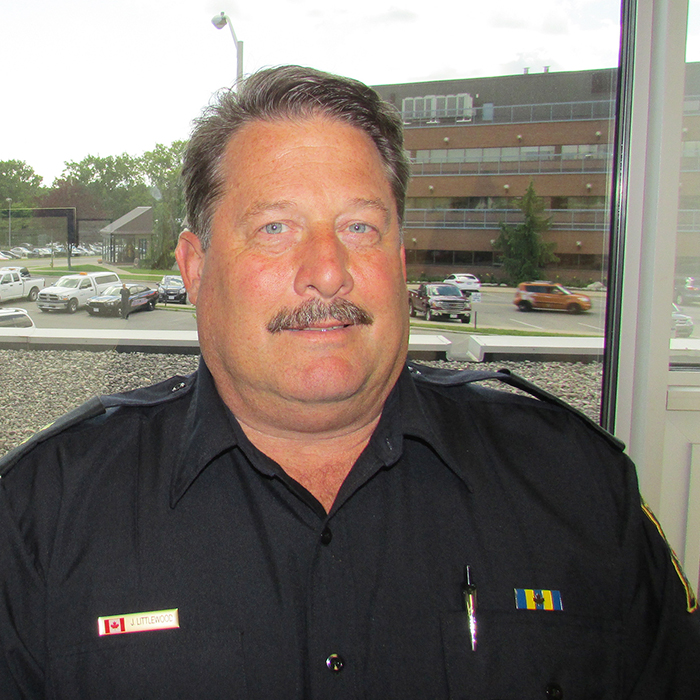
In Chatham-Kent, it’s all about community for the police service.
And it’s not just in regards to the officers dealing with people in the community, but being part of it, as well as the community working with officers to combat crime.
“Our chiefs have all seen the value of the community,” newly minted Deputy Chief Jeff Littlewood told The Chatham Voice. “And the reality is we do more non-police work than ever.”
When Littlewood first put on a badge for the Chatham Police in 1984, things were much different. Officers were sent out with nothing more than a radio, a sidearm and a set of handcuffs.
Chatham Mazda from Chatham Voice on Vimeo.
In those days, policing was reactive, especially on the weekend.
“We went from call to call,” he said. “We didn’t have the calls for service we have today. There were fewer social issues. You were there to combat crime and keep an eye on the undesirable elements too. We used to fill the (jail) cells on the weekend.”
Today, policing is much more proactive in a number of strategies the service employs. One is community mobilization, involving the public, essentially adding eyes and ears around the municipality without adding staff to the police service.
“Community policing is getting people mobilized and ultimately getting them engaged,” Police Chief Gary Conn said in a previous interview. “Citizens are our eyes and ears, but not our hands and our feet. If they see or hear something, they report it to the police and let us take it from there.”
Familiarity with police officers can help build trust that only augments community mobilization. Littlewood said police are part of the community; they live and raise families here.
Community involvement and engagement works for the public and the officers, Littlewood said. People get to see the people behind the uniform, and officers get a better feels for community concerns when they volunteer for groups, or coach kids’ teams, or hold charity events.
He said 95% of the population is law abiding and supports the idea of a safe community.
“It’s important that the public gets it. At the same time, we have to be more tolerant with the people who don’t get it,” he said.
Being part of the community, officers feel the impact of economic ebbs and flows.
Littlewood said the Navistar strike in 2002 was a challenge to local police officers. The picket lines got ugly at times.
“It was bad. I thought we were going to get overrun,” he said, adding it was often the fact officers were familiar with folks on the picket line that ultimately calmed things down. “I knew a lot of guys on strike. I said we (police officers) were part of the community too. We didn’t want the plant to leave and we didn’t want them to burn it down.”
Littlewood said the reality is officers do more non-police work than ever, as social issues often result in police officer being the first point of contact in many situations that have very little to do with law and order.
With that in mind, the service formed its Mobile Help Team, which is trained to deal specifically with mental health issues. Littlewood said an average of six officers per shift are Help trained.
Const. Brent Milne and now-retired Clare Wiersma started the team more than a decade ago. The Help team also works closely with health-care professionals, and includes a crisis nurse.
When there is a situation involving someone with a mental health issue, Littlewood said the Help training pays off.
“We try to send somebody that is Help-team trained to these calls,” he said.
Follow up work usually involves Milne and the crisis nurse.
“When they see Brent, there is no animosity,” he said of individuals who have a mental health problem and have dealt with police in the past.
Policing is also under a media microscope these days, especially south of the border, as most every citizen is armed with a cell phone that shoots video.
But Littlewood doesn’t think that is a bad thing, if kept in context. He also is a proponent of body cams for officers, if feasible.
“The good thing is it makes everybody better. People need to be reminded they do the right thing,” he said.
The cost of the equipment for a smaller police service can be daunting however.
“It’s not a cost we necessarily need to bear at this time.”
Littlewood understands police officers aren’t perfect; they’re human. He said while at a leadership conference in Toronto, he asked Bill Blair, chief of the Toronto Police Service, how he dealt with the reality that a handful of officers will “beat someone up due to their skin colour.
“He (Blair) said, ‘We recruit from the human race. You can’t tell someone is racist based on an interview. You have to take care of them as you come across them.’ It’s no different than any other profession.”
Through it all, Littlewood believes the people of Chatham-Kent support the police service.
“I think overall we have the public’s trust,” he said.
And that can be due in part to “carding,” a process where an officer stops someone who may be acting suspicious or may be out and about at a time of night when most people are indoors and asleep.
“You talk to people and find out what they’re doing,” he said. “You’ll know quickly if they’re good people or bad people. Bad people start running.”
Such practise is part of good policing in Littlewood’s book.
“You want to know who is on your beat. The public wants to know who is walking around their neighbourhood,” he said.






